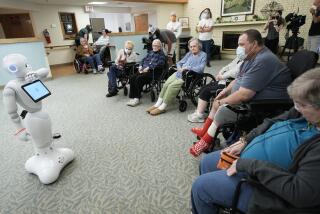Letters : Proposal May Help Caregivers
- Share via
Jane E. Allen is to be commended for her article “The Burdens of Love” (Aug. 2). She has focused on a critically important issue, the long-term care of growing numbers of older, culturally diverse Americans. She makes an important point: Family members, who take on most of the long-term care needs of their older relatives with chronic illnesses or disabilities, also take on a heavy burden, often with high levels of stress and depression.
It is for those family caregivers and for those older people who will require care that the Clinton administration has proposed the first step in a long-term care strategy for our nation. At the heart of the proposal is an unprecedented National Family Caregiver Support program, which, if fully funded and enacted by Congress, will give direct support to family caregivers.
Caregivers are usually women--the majority, older themselves--and many others in the work force who are juggling care of their elderly loved ones while running households and parenting children. The National Family Caregiver Support program would establish a comprehensive support system in each state and in communities throughout the country.
Services would include information and assistance, counseling, outreach, training and peer support, as well as desperately needed respite for family caregivers. Services will be tailored to meet the specific needs of minority members of the communities, helping to preserve the important cultural traditions while easing the heavy burden of love.
Caregivers deserve our support. They keep our families together. They demonstrate the love and embrace the commitment that distinguish the family unit from any other. Families are among our most valuable resources. The proposed National Family Caregiver Support program recognizes this and represents a compassionate response to what is expected to be one of the principal challenges of the next millennium: long-term care.
--JEANETTE C. TAKAMURA
Assistant secretary,
Administration on Aging
Department of Health and Human Services
*
Letters should be brief and must include the writer’s name, address and phone number. Internet writers must also include name, street address and telephone number. No pseudonyms may be used. Letters are subject to editing and condensation. Mention date of publication when referring to a specific article. Mail to Letters in Health, Los Angeles Times, Times Mirror Square, Los Angeles, CA 90053; e-mail to [email protected]; or fax to (213) 237-4712.


